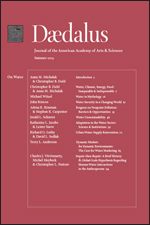August 07, 2015 | Water in the West | Insights
 Challenges in the use of water continue to grow with changes in weather, climate and population. As guest editors of the journal Dædalus, Stanford Professors Anna Michalak and Chris Field frame these challenges within a context of the decisions they call for and the emerging opportunities they offer. The journal assembles related concepts from water experts, including Richard Luthy, David Sedlak and Terry Anderson.
Challenges in the use of water continue to grow with changes in weather, climate and population. As guest editors of the journal Dædalus, Stanford Professors Anna Michalak and Chris Field frame these challenges within a context of the decisions they call for and the emerging opportunities they offer. The journal assembles related concepts from water experts, including Richard Luthy, David Sedlak and Terry Anderson.
Michalak is a professor in the Department of Earth System Science at Stanford, and a faculty member in the Department of Global Ecology at the Carnegie Institution for Science. Field, a Senior Fellow with the Stanford Woods Institute for the Environment (Biology, Earth System Science), is Founding Director of the Carnegie Institution for Science's Department of Global Ecology.
Water, Climate, Energy and Food
Decisions about water are complex because they involve a system of interactions among water, climate, energy, and food, observe Field and Michalak in an article they contributed to the journal. For instance, the antagonism between environmental and agricultural water interests may appear to be simple and direct. But in fact, the issues at stake—such as runoff of fertilizer—involve multiple trade-offs, the authors note. They suggest that a systems approach may be required to identify remedies. “For some processes, the impacts of recent and future climate changes are clear,” Field and Michalak write. “For others, the complexity of the climate system and the uncertainty of future human actions make both detection of past changes and prediction of future patterns fiendishly difficult.”
Water Stress, Willingness to Pay Prompt New Water Supply Approaches
Opportunities lie along a predictable path toward new technological solutions to reinvent urban water supply, according to authors Luthy and Sedlak. “New water-supply approaches can provide a viable means of breaking the longstanding dependence of cities on imported water,” Luthy and Sedlak write. “However, these pioneering efforts were prompted by severe water stress and cities’ new willingness to pay for technologies that were expensive relative to conventional options.”
The authors examine examples of cities’ past adaptations of technologies for desalination, stormwater use, water recycling, and potable water reuse, in the American West and Australia. They share observations of the processes and policies that encourage transitions to resilient urban water supplies. In many cases, only a few early adopters implement pioneering projects. As these projects’ managers work through the barriers of financing, regulation, and operation, they diminish those risks. As barriers and perceived risks are lowered by a growing network of adopters, new technologies become implemented more widely, the authors note.
Luthy is Senior Fellow, by courtesy, (Civil and Environmental Engineering) with the Stanford Woods Institute for the Environment, and David Sedlak is the Co-Director of the Berkeley Water Center.
Water Marketing
The economic arena provides opportunity to improve water allocation, notes Anderson, the John and Jean De Nault Senior Fellow at the Hoover Institution at Stanford, in the case for water marketing. Human and natural demands on water vary in the short-run as well as over the longer term with changes in weather, climate, and other factors, observes the author. “Water markets provide a way of connecting human demands to nature’s supplies through prices, which signal values and scarcity,” he writes. Well-defined, enforced, tradable water rights could open new pathways toward satisfying demands for water quantity and quality, Anderson posits.
Decisions about water often tell us more about our priorities than they do about the total amount of available water, note Field and Michalak. Their editorial work reveals the range and promise of those decisions.


![[Woods Logo]](/sites/default/files/logos/footer-logo-woods.png)
![[Bill Lane Center Logo]](/sites/default/files/logos/footer-logo-billlane.png)